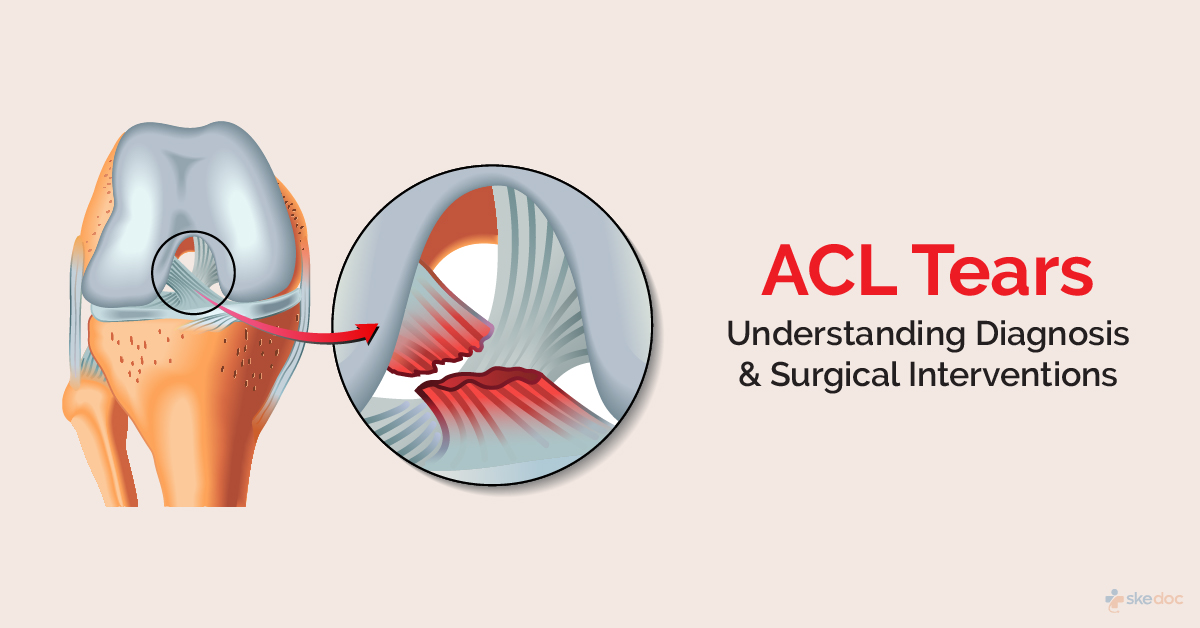Allergy
Blood Diseases
Bone & Joints
Brain
Cancer
Child Care
Cosmetic Surgery
Diabetes
Endocrinology
ENT
Eye
Gen Medicine
General Surgery
Heart
Kidney
Lifestyle
Liver & Digestive
Lung
Men’s Health
Mental health
Physiotherapy
Rheumatology
Skin and hair
Sleep Disorders
Spine
Transplant
Women Health
Thyroid
Vascular Surgery
ACL Tear

Overview
The anterior cruciate ligament (ACL) is one of the strongest bands of tissue that helps connect the thigh bone (femur) to the shin bone (tibia). An ACL injury is a tear or sprain of the anterior cruciate ligament. It is one of the most common injuries that occur during sports that involve sudden stops or changes in direction, landing, or jumping, which includes soccer, football, basketball, etc.
Causes
There are various ways by which anterior cruciate ligament tear occurs. They include:
- Sudden slowing down or change in direction rapidly while playing sports
- Landing awkwardly from a jump
- Stopping suddenly
- Pivoting with the foot firmly planted
- Direct contact or collision, such as a football tackle
- Slowing down while running
- Overextending of the knee joint
- Injury to the anterior cruciate ligament.
Risk factors
The risk factors that are associated with anterior cruciate ligament are:
- Environmental risk factor- for example- high-level friction between shoes and playing surface
- Anatomical risk factor- for example- narrow femoral intercondylar notch
- Gender- the incidence is more common in females compared to men
- Individuals who are participating in certain sports, which include soccer, football, gymnastics, basketball, and downhill skiing
- Wearing footwear that does not fit properly
- Playing an artificial turf
- Using faulty movement patterns
Symptoms
The symptoms that are associated with anterior cruciate ligament tear include:
- Loud pop or popping sensation in the knee
- Rapid swelling present in that area
- Severe pain persists
- Loss of range of motion
- Inability to perform routine activities
- Discomfort while walking
- Tenderness present along the joint line
- Inability to bear the weight
- Instability of the knee
Diagnosis
Whenever the patient approaches the doctor, the doctor will initially record the patient's history. The doctor will record the physical activities and the cause of injury to the anterior cruciate ligament. To confirm the condition, the doctor will perform a couple of tests. They include:
- Physical examination- The doctor will perform a couple of physical tests in order to assess the severity of the condition. They include the Lachman test, anterior drawer test of the knee, and pivot shift.
- Investigational scans- they include x-rays of the bone fracture. Other scans include an MRI scan, which will help the doctor locate and assess the extent of the ACL injury, and an ultrasound scan.
Treatment
The treatment of the anterior cruciate ligament tear depends on the grade of the tear. There are various ways by which ACL tear can be treated. They include:
- Rest- Patients diagnosed with anterior cruciate ligament tear should avoid knee overuse during the healing process. The patient is advised to take complete rest to heal faster.
- Ice pack- Apply cold compression or ice pack wrapped in a thin towel to the knee for at least 15 minutes and repeat the procedures daily for a few days.
- Compression bandage
- Leg elevation- regularly prop up the knee and leg above the heart level
- Rehabilitation
- Anterior cruciate ligament reconstruction surgery
Complications
The complications that are associated with anterior cruciate ligament tear include:
- Bleeding and blood clot formation, which will result in the deterioration of the condition
- Continued and severe knee pain
- Limping and reduced ability to move
- Stiffness or weakness of the knee
- Improper healing, thereby worsening the condition
Prevention
There are various ways by which anterior cruciate ligament tear can be prevented. They include:
- Proper training and exercises can help minimise the risk of ACL injury.
- Exercises to strengthen the core of the muscles, which include hips, pelvis, and lower abdomen
- Exercises that strengthen leg muscles, which include hamstring exercises, to ensure an overall balance in leg muscle strength
- Training to improve technique when performing pivoting and cutting movements.
- Wear proper protective equipment if required
- Warm exercises and stretching exercises before playing any sports
FAQ
Q. What are the grades of anterior cruciate ligament tear?
A. ACL injuries are commonly classified into three grades. They include:
- Grade 1- There is mild damage to the anterior cruciate ligament during this grade.
- Grade 2- ACL injuries are rare. During this grade, the ACL is stretched and partially torn.
- Grade 3- During this grade, the ACL is completely torn out, and the patient may require surgical reconstruction of the anterior cruciate ligament.
Q. How common is anterior cruciate ligament injury?
A. The incidence of anterior cruciate ligament injury is very common. The anterior cruciate ligament is one of the most injured knee ligaments. It is estimated that around 1,00,000 to 2,00,000 people in the ACL tears annually in the USA.
Q. What is the prognosis of anterior cruciate ligament tear?
A. Patients treated with surgical reconstruction of the ACL have long-term success rates of 82-95%. Recurrent instability and graft failure is seen in approximately 8% of the patients.
References
1.https://www.mayoclinic.org/diseases-conditions/acl-injury/symptoms-causes/syc-20350738
2.https://orthoinfo.aaos.org/en/diseases--conditions/anterior-cruciate-ligament-acl-injuries/
3.https://medlineplus.gov/ency/article/001074.htm
4.https://my.clevelandclinic.org/health/diseases/16576-acl-tear#symptoms-and-causes
Was this article helpful?
YesNo
Comments





